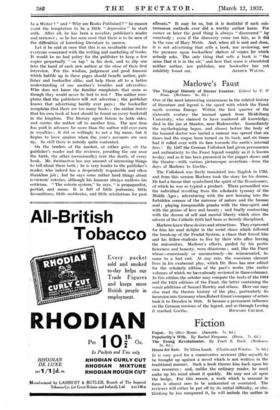• Marlowe's Faust
The Tragical History of Doctor Faustus. Edited by F. 8' Boas. (Methuen. 8s. 6d.)
ONE of the most interesting occurrences in the related history of literature and legend is the speed with which the Faust myth overran Europe. Within the first quarter of the sixteenth century the learned quack from Heidelburg University, who claimed to have mastered all knowledge, died in the inn at Staufen, near Badenweiler. Immediately the mythologizing began, and almost before the body of the learned doctor was buried a rurrlour was spread that six times had the corpse been turned on its back, and six times. had it rolled over with its face towards the earth's internal fires ! • By 1587 the German Volksbuch had given permanence and authenticity to the Faust -legend roughly as it is known to-day, and as it has been presented in the puppet shows and the theatre—with various picturesque accretions—from the days Of Marlowe to Geethe."
The Volksbuch was freely translated into English in 1392, and from this version Marlowe took the story for his drama. He had a theme that symbolized the spirit of the Renaissance, of which he was so typical a product. There personified was the individual revolting from the scholastic tyranny of the Middle Ages ; adventuring with the new learning into the forbidden corners of the universe of nature and the human soul ; playing irresponsible pranks with the time-spirit and with the genius of love and beauty ; and finally contracting with the demon of self and mental liberty which since the advent of the Catholic faith had been so fiercely disciplined.
Marlowe knew these desires and attractions. They expressed for him his mad delight in the social chaos which followed the break-up of the Feudal System, a chaos that forced him and his fellow-students to live by their wits after leaving the universities. Marlowe's efforts, guided by his poetic fierceness and honesty, were disastrous ; and, like the Faust whom—consciously or unconsciously—he reincarnated, he came to a bad end. At any rate, the conscious element lives in his exuberant play, which Dr. Boas has now edited for the scholarly edition of the poet's works (the earlier volumes of which we have already reviewed in these columns). In this edition the scholar may .compare the texts of the 1604 and the 1624 editions of the Faust, the latter containing the comic additions of Samuel Rowley and others. Here one may also read the theatre history of the play, particularly its incursion into Germany when Robert Green's company of actors took it to Dresden in 1626. It became a permanent influence on the German versions of the legend, and so through Lessing


















































 Previous page
Previous page